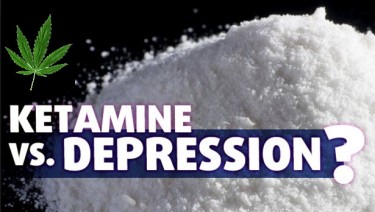
Can you use ketamine (horse tranquilizer) to treat alcoholism? Studies say yes!
Ketamine is a powerful anesthetic. It has long been known as a tranquilizer for horses, but is also used to calm other small animals.
Ketamine is also approved as a tranquilizer for humans. The Food and Drug Administration has already approved esketamine, a nasal spray containing ketamine, to treat depression. However, people have discovered that ketamine can also be used as a recreational drug. It is consumed recreationally by snorting or injecting, although ketamine pills are also available for oral consumption. Due to its anesthetic properties, it can induce a high and unconsciousness when ingested in sufficient quantities. It can be very dangerous to use ketamine without proper supervision.
Unlike other mainstream psychedelics like magic mushrooms, it is not advisable to take ketamine alone. But researchers have found that in addition to treating depression, ketamine may have another additional therapeutic benefit: treating alcoholism.
Alcoholism is one of the most difficult addictions to treat, especially considering how widespread and readily available it is. Those who struggle with alcoholism are also very diverse; There are those who can drink all day, while others binge drink a few times a week. And just like other types of addiction, alcoholism will affect daily life. In extreme cases, it damages their careers and personal relationships, and it’s also common for alcoholics to face legal problems for driving under the influence.
In the United States alone, an estimated 15 million people are living with some type of Alcohol Use Disorder (AUD). Yet only a small percentage get adequate treatment.
Alcohol use disorder is also extremely dangerous for society. It has been linked to ER visits, deaths, car accidents, and more. Without treatment, individuals suffering from it can die from a range of alcohol-related health problems, including heart disease, liver disease, cirrhosis, stroke, high blood pressure, and more.
For this reason, it is crucial for medical experts to find an effective and fast treatment.
What the studies say
Early last year, the results of a study uncovering the potential of ketamine to treat alcoholism were published in the medical journal American Journal of Psychiatry. For the study, the researchers analyzed volunteers over a period of 6 months. Their alcohol consumption was assessed using a device worn as an anklet. They were also asked to attend three 40-minute visits to a ketamine clinic during the first 60 days. There they received 0.8 mg/kg ketamine intravenously.
The volunteers were also divided into groups: those who undertook ketamine and psychotherapy, another who took ketamine and attended alcohol education sessions, a third who received a placebo and was coerced into therapy while the last was a group given placebo and alcohol education.
The article’s lead author, Celia Morgan, who is also Professor of Psychopharmacology at the University of Exeter, told Technology Networks that the key discovery was that “a fairly brief ketamine-assisted psychotherapy had a really long-lasting effect on alcohol consumption .” Morgan explained that those who took ketamine and underwent therapy abstained the most from alcohol. The volunteers in this group were able to abstain from alcohol for between 162 and 180 days, which is impressive.
Meanwhile, another 2019 study came to similar conclusions. This study was led by Elias Dakwar, MD, an associate professor of clinical psychiatry at Columbia University’s Vagelos College of Physicians and Surgeons. The study involved analyzing 40 people who were diagnosed with an alcohol use disorder despite seeking treatment. They were randomized to receive a subanesthetic dose of either ketamine or midazolam. They were then asked to undergo motivational treatment, a form of psychotherapy that has had mixed results with treatment for alcoholism.
According to the researchers, motivational therapy might be more effective when combined with ketamine at the beginning of therapy. They found that 82% of volunteers were more likely to abstain from alcohol after ketamine and therapy. On the other hand, 65% of those given midazolam were able to avoid it. It was also hopeful that those given ketamine took much longer to relapse and reported fewer days of heavy drinking compared to the other group.
Researchers reported that ketamine was generally well tolerated by researchers.
“Our findings add to a growing body of evidence that a single dose of drugs with strong psychoactive effects, such as MDMA, psilocybin, and ketamine, can have immediate and long-lasting behavioral effects, particularly when integrated into psychotherapy,” reports Dakwar.
“In our participants, ketamine appears to increase resilience and decrease post-slip demoralization,” adds Dawar. “Participants may have been better able to recover after slipping and they may have been more motivated to resume recovery work. In contrast, in the midazolam group, there was a higher likelihood that use escalated after slipping and either relapsed or discontinued therapy,” he said.
At this point, experts aren’t sure how exactly ketamine works to curb alcoholism. It can be a biological response, or there can be something in the drug that makes people stop drinking.
Conclusion
There is hope for the use of ketamine to treat alcoholism, as indicated by these studies. More studies need to be done, although many are optimistic that this could be another way to effectively treat and transform people’s lives. Experts need to study ketamine further, especially the complexity involved and how it works in the human body, before it can be used safely later.
KETAMINE AND DEPRESSION, READ MORE…

KETAMINE VS. DEPRESSION, WHAT DOES THE STUDY SAY?

Post a comment: